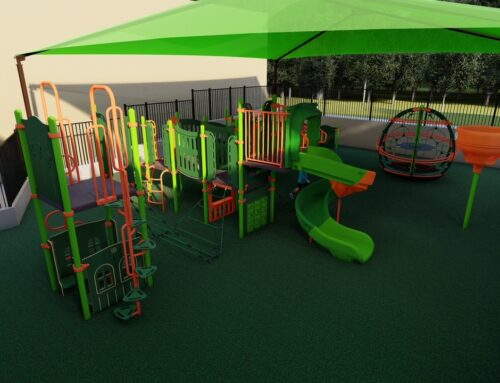Technically savvy
About a dozen Woodrow Wilson High School students congregate around a table in a classroom where the Science Technology Engineering and Math (STEM) students usually hang out, although not all the students are STEM students.
A couple of them duck into a closet and emerge with a robot on wheels that’s at least six-feet-tall. They call the bot “Tote Stallion.” (Its name is based on a joke from a video game, one of the students points out. “I would explain it, but it would take too long,” he says.)
Tote Stallion is the product of Woodrow’s robotics team, otherwise known as the Robocats. Woodrow teacher Brandon Carver formed the team in 2012 shortly after he joined Woodrow’s staff as the head of the engineering department; however, Carver says Woodrow student Joey Hines, who graduated from the STEM academy this year, is the person responsible for the success of the program. Hines was the one who kept it going the first year when the other students gave up after realizing how difficult and time-consuming robotics really is.
Eventually it caught on, and now every year the Robocats build two robots out of metal, cardboard, PVC pipe, wire, circuit boards and other material or gadgets. The robots are constructed for state and national competitions to achieve a certain task, such as stacking totes or tossing a large ball through a hoop. The students have to create a robot that can perform the task as efficiently as possible. Then they compete against other schools — with intensity.
In their very first competition, the Woodrow team placed sixth, which isn’t bad considering most of their robots are primarily made of PVC pipe and cardboard while other schools have fancy metalwork, and they later placed third place in BEST.
In three short years, Robocats has become a lifeline for some Woodrow students who otherwise wouldn’t have an avenue to show off their unique talents and skillsets.
“They identify as the robotics team,” Carver explains. “And from a teacher perspective, I’ve seen certain students develop identity through the team. The students come here and build robots together, and it’s usually a group that wouldn’t find an identity anywhere else. At least this exists. If this didn’t exist, what would you do?”
“Probably just go home after school like I did freshman year and not like going to school,” Hines replies.
“You didn’t like going to school?” Carver asks.
“No,” Hines says. “I wanted to be in engineering, but I went to class my freshman year and people didn’t want to be there. I didn’t really feel like I identified with the school. My sophomore year, Mr. Carver and Mr. [Jeremy] Turner came, and they completely changed the engineering department.”
But students don’t have to be engineering students or technology whizzes to earn the right to hang out with the Robocats. The team welcomes anyone who wants to learn.
“We often don’t have enough people who can do stuff beyond just building the robot,” Hines says. “Maybe you know how to build a website or design a logo or paint? We try to emphasize that anyone can come, regardless of how much they know or don’t know, and hopefully they’ll learn something once they get here.”
Beginning with a bang
Jennifer Garcia, this year’s new athletic coordinator at J. L. Long Middle School, isn’t a shy woman — except when you ask her to brag about her recent success at Long.
Luckily, the numbers speak for themselves.
The Long girls’ volleyball team was undefeated all season, which earned them the title of Dallas ISD’s city champions. Long’s co-ed soccer team never had a single goal scored against it the entire season, including playoff games. The girls’ track and field teams, for the first time ever, scored first in long jump and second in triple jump. And the baseball and softball teams, which both were still competing at the time of publication, are poised to win district.
Garcia won’t take credit, however, instead giving it to her predecessor, Deborah Barnd, who headed the department for 17 years and built the sports programs from the ground up.
Before becoming coordinator, Garcia spent nine years teaching in deaf education at Long and also coaching alongside Barnd. When Barnd was ready to retire, she encouraged Garcia to apply for the job.
“I just stepped in at the right moment,” Garcia insists. “I was around Debbie, so I know how she ran her program. So I just kind of kept her legacy going.”
While Barnd was at Long, she worked hard to drum up community support and encourage Lakewood-area elementary schools to involve students in sports before they attended Long. That tactic was practically a miracle for the football team, which was on a multiple decades-long losing streak.
When Long’s football players began coming to Long better prepared, Long suddenly started winning — a lot. The football team even won the city championship in November.
Barnd used the same tactic in other sports, which is why Garcia anticipated a good year this year.
“We saw a strong group coming up, and so we knew we’d do well,” she explains.
When Garcia took over as head coach, her No. 1 agenda was to adopt Barnd’s mindset, which is a simple one: Treat everyone like family.
“The coaching staff here is one big happy family,” Garcia says. “The parents, too — the support we have here is awesome, and we treat the students like our own.”
Everyone is excited after the successful year, and Garcia hopes to harness that momentum moving forward.
“I just want to keep that energy up,” she says.
Gee, math whizz
Juan Fernandez has sixth-graders doing trigonometry for fun.
Fernandez is the math coach at J. L. Long Middle School, so it’s his job to drill students to prepare them for regional and state competitions, where they race against other schools to solve top-level math problems.
The tests are grueling. One requires students to answer 80 questions in 10 minutes without writing anything down. The questions range from sixth-grade level math to college level math. Then they have a calculator test, which includes things like functions, scientific notation, geometry, trigonometry and reverse Polish notation. Then they take a general math test.
Did we mention they do this on purpose?
Although Fernandez’s sixth- through eighth-grade teams had stiff competition this year, they outperformed the schools in the region, including private schools, which typically prevail in math and science competitions.
Fernandez was involved in the math team when he was a student at Long, and at the time the team performed well in regional and state competitions, but it fell from grace between then and now. When Fernandez started coaching the Long math team in 2012, he only had one student who qualified for state. This year 19 out of 24 of Fernandez’s students qualified.
“We just keep getting better and better,” he says. “Last year we were seventh in the state, but it was my seventh-graders against their eighth-graders. This year it was my eighth-graders against their eighth-graders.”
Long eighth-grader Gage Broberg placed first in the region in the Number Sense category (the one in which students answer 80 questions in 10 minutes), and Fernandez helped the math team once again qualify for the state competition in San Antonio. In April, the team competed and ranked ninth in state, despite moving from the 4A division into 5A. They out-ranked Dallas-area private schools St. Mark’s School of Texas and Episcopal School of Dallas.
Gage is moving onto Woodrow next year, which doesn’t have a math team, but his little brother, Cole, a sixth-grader this year, has the potential to follow in his footsteps as a golden ticket for the Long math team. Fernandez also has a group of seventh-grade girls coming up next year that he expects to do well.
“They’re really competitive with each other,” he explains. But what he really wonders is how his efforts will pay off farther down the road.
“I want to see what my kids’ SAT scores are once they start taking SATs,” Fernandez muses, “because I think they’re going to dominate with all the stuff I’ve taught them.”




